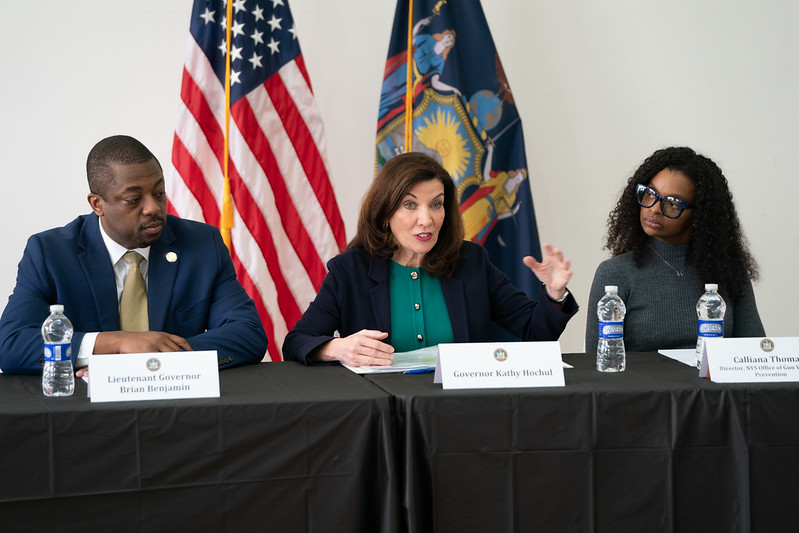
Top New York officials (photo: office of Governor Kathy Hochul)
Jewish tradition offers us a comprehensive blueprint for how to build just and caring communities. From the very beginning of our story, we learn that we are knit together with a clear directive toward mutual obligation and responsibility. Supporting and nurturing our children is a fundamental part of that ethos.
We were devastated to see Governor Hochul’s last-minute proposals to include rollbacks to New York’s historic Raise the Age legislation in state budget negotiations. Before the original Raise the Age bill passed in 2017, we at Central Synagogue and Congregation Beth Elohim were at the table from the beginning to build support around the legislation, joining with over 65 faith communities and justice organizations from across the city and state to mobilize support for our young people.
New York must continue to protect Raise the Age. We must resist this new call to make it easier to prosecute 16- and 17-year-olds as adults in criminal court, because that would encourage regressing back to failed, racially-biased policies of the past – and leave our children as collateral damage.
At a moment when New Yorkers are still reeling from the devastation of the pandemic, we cannot allow fear to eclipse facts. State leaders must lead with courage and resist any efforts to roll back Raise the Age. We must invest in public safety solutions that address the root causes of gun violence and give the youngest New Yorkers the opportunity to heal and flourish.
To put it simply: rolling back Raise the Age will not make New York safer. While it is clear that the uptick in gun violence is an epidemic that requires action, the Raise the Age law is not responsible for this crisis. During the first 18 months of Raise the Age, shootings in New York City remained the lowest they’ve been in decades, even as arrests and incarceration of 16- and 17-year-olds declined. It was only after widespread COVID-19 infections, death, and lockdowns that gun violence spiked, a trend that was felt across the country, including in cities where similar criminal justice reforms had not been enacted.
Jewish law carves out a special place for children, outlining their rights and what they are owed not only by their families but also by the entire community. Our children are resilient, but it is on us to ensure they have the support they need to grow and thrive. Part of that support must come in the form of setting boundaries and teaching them to be accountable for their actions, but doing so in a way that supports their development in the long term. Treating them in age-appropriate ways in the legal system strikes this balance. The family court provides accountability -- including detention and long-term placement in a residential facility in serious cases -- but it also provides mental health, education, and other supports designed to promote wellbeing and reduce recidivism. In the most serious cases, where a young person displays or uses a deadly weapon, Raise the Age dictates that the case remain in adult court, but is heard by a judge with family court training.
As we continue to process the collective trauma of the COVID-19 crisis across New York and work to uproot systemic racism from our criminal legal system, this is the moment for a bold new vision for youth justice for more resilient and safer communities. New York needs robust investments to lift incomes, promote housing security, and expand access to mental health and social and emotional learning supports in our schools. They also must invest in community-based violence prevention, alternatives to incarceration, and restorative justice programs.
We also need to ensure that full funding for Raise the Age is reaching communities, which has not happened in the five years since the law went into effect. As lawmakers in Albany finalize the state’s fiscal year 2022-2023 budget, the Governor and Legislature must streamline the process for Raise the Age implementation, making certain resources reach localities quickly to support direct service organizations led by and serving youth that are rooted in the community.
To imagine a criminal legal system and state shaped by Jewish notions of justice is to see a system that upholds the dignity of every person and is animated by the value of teshuvah, of transformation and return. To state that another way: true repentance, atonement, and healing can only happen in the community and with support, not through excessive punishment and permanent exile. New York must protect Raise the Age.
***
Rabbi Hilly Haber is Director of Social Justice Organizing and Education at Central Synagogue in Manhattan. Rabbi Stephanie Kolin is a rabbi of Congregation Beth Elohim in Brooklyn.
***
Have an op-ed idea or submission for Gotham Gazette? Email This email address is being protected from spambots. You need JavaScript enabled to view it.




